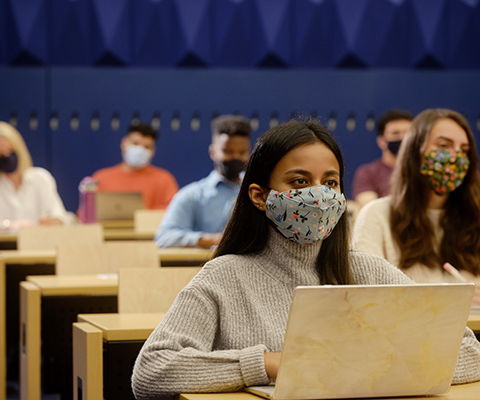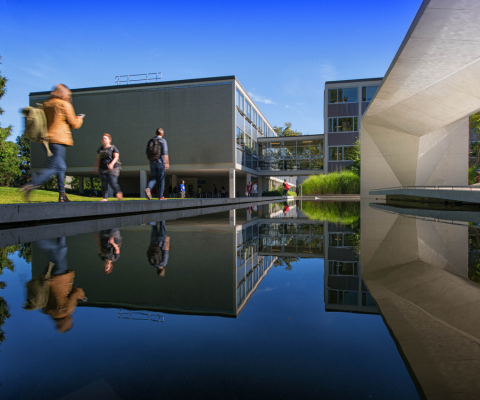2021 highlights from Canadian universities

As we kick off 2022, we’re taking a moment to appreciate Canadian universities’ progress despite the challenges the past year and the pandemic presented.
Deepened our understanding of COVID-19 and its variants
University research over past decades (at The University of British Columbia, for example) played an important part in developing the COVID-19 vaccines, which have helped curb the spread of the virus. Throughout 2021, university researchers continued to fight the virus by studying it and its variants and remain committed as we deal with an ever-changing landscape.
University of Ottawa professor Dr. Marc-André Langlois has been leading the Coronavirus Variants Rapid Response Network, which answers critical questions about the severity, transmissibility and possible vaccine resistance of new COVID-19 variants. Vivek Goel, president of the University of Waterloo, has been a member of Canada’s COVID-19 Immunity Task Force, which studies how to detect new variants, how long immunity lasts and how COVID-19 affects different populations in Canada.
Celebrated outstanding women in science
Dr. Alison McAfee of The University of British Columbia and North Carolina State University and Marie-Laurence Lemay of the Université de Montréal were awarded the 2021 L’Oréal Canada For Women in Science Research Excellence Fellowships. Their award-winning studies centered on honeybee reproduction and a bacteria-fighting virus with potential to become an alternative to antibiotics, respectively.
Committed to tackling anti-Black racism on campus
In November 2021, universities and colleges across Canada signed on to the Scarborough Charter—representing a commitment to take concrete, meaningful action to address anti-Black racism and promote Black inclusion in Canadian higher education. Specific university initiatives to promote equity, diversity and inclusion are listed on our website.
Prioritized safety and wellbeing throughout the pandemic
At every turn of the pandemic, universities kept the safety and wellbeing of students, staff and faculty as their top priority. Thanks to significant investments in digital infrastructure, universities were able to offer courses online during the first part of the year. In the fall, universities worked tirelessly to implement measures to allow a safe return to campus for students and staff, and they continue to adjust as the pandemic evolves.
Paved the way for a more accessible future
Inspired by the Innovative Designs for Accessibility (IDeA) competition, university students developed creative solutions to challenges faced by people with disabilities. This included an app to help those with visual impairments manage their wardrobe, a mechanical arm to help with everyday tasks and technology to alert hearing-impaired drivers to emergency vehicles.
Recognized internationally for exceptional research
Canadian researchers continued to make their mark on the world stage. In 2021, 25 Canadians won major international awards, including the Université de Sherbrooke’s Alexandre Blais whose work in quantum computing earned him a Guggenheim Fellowship in Physics, and Sophie Rousseaux of the University of Toronto who was awarded a Sloan Research Fellowship in Chemistry.
Focused on Indigenous education and reconciliation
In 2021, Indigenous and higher education leaders gathered together, virtually, for the 6th National Building Reconciliation Forum. Co-organized by Université Laval and the Université du Québec network, the event gave participants insight into the realities of Indigenous students and researchers in the province of Quebec and across the country. Discussions centered around valuing Indigenous knowledge and supporting Indigenous education and research, with an emphasis on turning these meaningful discussions into action.
Discovered more about Canada’s North
Students researching the unique ecosystems, biodiversity and more in Canada’s North were recognized in 2021. This year’s winners of the Weston Family Awards in Northern Research included McGill University PhD student, Julia Baak, who studies the effects of plastic pollution on Arctic seabirds, and University of Manitoba PhD student, Enooyak Sudlovenick, who studies beluga whale health and Inuit knowledge.
Protected access to educational materials
In July 2021, the Supreme Court of Canada made an important decision on copyright law that impacts university students, staff and faculty. The court ruled to uphold a balanced view of “fair dealing”—meaning that students and professors can continue to access small portions of a work (i.e. article, book, audio recording, etc.), without incurring fees or copyright challenges, to further their education. This decision by the Supreme Court balances the interests of copyright users and creators and ensures Canada’s students will continue to have the 21st century education needed in our rapidly evolving world.
About Universities Canada
Universities Canada is the voice of Canada’s universities at home and abroad, advancing higher education, research and innovation for the benefit of all Canadians.
Media contact:
Lisa Wallace
Assistant Director, Communications
Universities Canada
[email protected]
Tagged: Universities Canada news
Related news
-

New report shows Canadian universities’ commitment to climate action
-

Canada's universities welcome significant investments in research, students and mental health in Budget 2024
-

Message to Universities Canada members from president and CEO Gabriel Miller
-

Addressing Canada’s biggest challenges at Accelerate 2024
